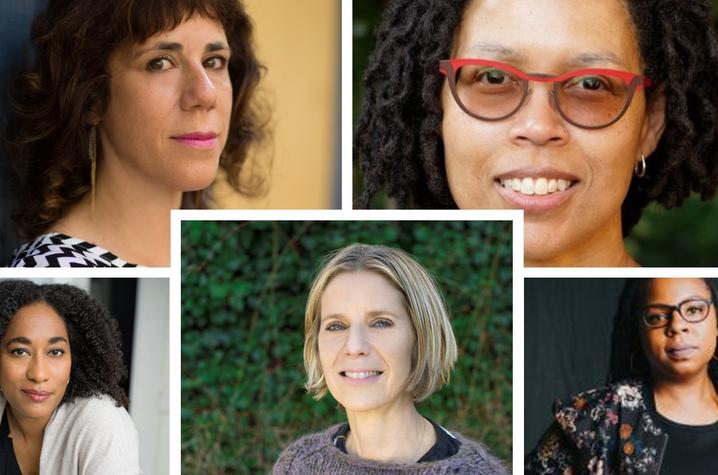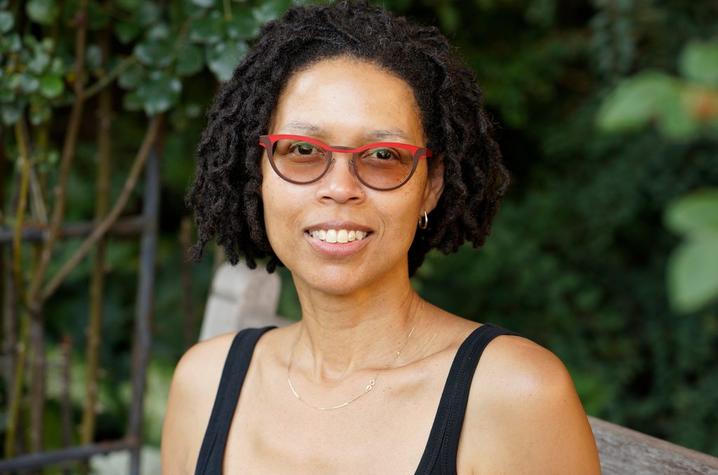COVID Plot Twist? Q&A With Women Writers Conference Director About Reinventing the Virtual Edition
LEXINGTON, Ky. (Sept. 7, 2020) — Since the COVID-19 pandemic landed in the United States, organizations of all kinds have been scrambling to maintain some sense of normalcy within their programming while keeping their participants safe and healthy. The Kentucky Women Writers Conference is no different.
Sadly, arts and culture groups are among those entities most adversely impacted, as their work often brings together groups of people — from intimate readings to auditorium filled screenings — in events frowned upon during a global pandemic. That said, the organizations are the source of the soulful types of work society needs in such difficult times to commiserate and uplift.
Understanding this need and feeling a sense of duty to the history of the conference, the Kentucky Women Writers Conference has gone virtual this year. While aspiring writers may not convene again in Lexington this fall, they will join together online and hear from an amazing line-up of writers including poet Evie Shockley, author Jami Attenberg, novelist, essayist and filmmaker Bridgett M. Davis, memoirist Darcey Steinke and University of Kentucky’s own Mariama J. Lockington.
And plot twist — this virtual format of the conference will be the most affordable and accessible in the history of the program. In addition to the savings, the event will also continue to offer several free events for those unable to “attend” the conference in its entirety.
To find out more about the conference and what attendees can expect, UKNow caught up with Kentucky Women Writers Conference Director Julie Wrinn.
UKNow: How and when did you decide to take this annual conference virtual? Did you ever consider canceling?
Wrinn: Our Board of Directors met in late April (on Zoom, of course) and decided to make it a virtual conference. That early in the pandemic, we were already having “uncertainty fatigue” and wanted to commit to making the conference happen virtually, somehow, details TBA. We never considered canceling. Many people know that ours is the longest running event of its kind in the nation — this is the 42nd annual conference — and we felt a responsibility to uphold that legacy, to encourage, lift up, and inspire women writers and readers, especially during a pandemic.
UKNow: What did that transition look like?
Wrinn: I have a Board of Directors who are visionary, savvy, and very generous with their time. We had five months to teach ourselves Zoom and how to hold a virtual conference. The planning committee especially — Randi Ewing, Cam Holzer, Ashley Sipple-McGraw, and Katy Yocom — has been meeting with me regularly to work through a whole new set of logistics and to reimagine how to create a welcoming and inclusive space for women’s words in the online realm. We are determined to make our registrants feel fully supported, with opportunities for interacting with renowned authors, with our literary agent Erin Hosier, and with each other.
It costs less to hold a virtual conference — there are no expenses for travel, hotel, venues, and catering — and I wanted to pass those savings along to our registrants. General admission is only $25.
Also, the scheduling logic is entirely different. For an in-person conference, you want to offer a densely packed experience of concurrent sessions. By contrast, for a virtual conference, nobody wants to spend 12 hours a day in front of a computer. Instead, you air it out and spread the sessions over a longer period of time. Registrants don’t have to decide what to see and what to miss: they can see everything, while still having time to step away from their computers and regenerate before the next session.
Except for the small-group workshops, which will not be recorded, we’re recording all sessions and making them available to registrants for about a week after the conference. I’ve heard from women overseas, in time zones where the recordings are really the best option for them.
UKNow: The conference brings together many of the country's best writers. What was their response to the change?
Wrinn: We had 10 writers under contract before the quarantine began, and every single one of them was willing, able, and excited to shift to online. Like so many artists and performers, writers are losing income and opportunities during the pandemic. Book tours and signings are canceled. In the same way that we felt a responsibility to our registrants not to cancel the conference, we felt a responsibility to our presenters to maintain the original fees that we had negotiated with them before the pandemic.
Our organization has a unique structure: it’s a collaboration between the UK College of Arts and Sciences and Kentucky Women Writers Conference Inc., a separately incorporated nonprofit that received grants from LexArts’ Fund for the Arts and from the Kentucky Foundation for Women. Without those resources, it wouldn’t have been possible to hold the conference this year due to the budget situation at UK.
UKNow: What do you hope the virtual format might bring to the conference?
Wrinn: While it won’t have exactly the same feel as an in-person conference, it’s important to compare a virtual conference to the only other possibility these days, which would be a socially distanced, mask-wearing affair. In many ways, being in intimate spaces with writers onscreen who are not masked should be a much better experience.
UKNow: Are there any new opportunities this format will make possible?
Wrinn: The combination of lower admission fees and being online makes this the most accessible conference in our history. I’ve heard from many women who always wanted to attend in years past but couldn’t make the trip or have a disability that makes conference participation difficult. For them, the virtual format is a wonderful innovation.
Also, board member and Sonia Sanchez Series Chair Patrice Muhammad was very creative in coming up with an event that could only be held online: a Netflix-style viewing party of a documentary film about the series’ namesake. Patrice will host an online screening of “BaddDDD Sonia Sanchez” where viewers can engage with each other by typing chat room comments during the film. The 2017 Emmy-nominated documentary explores the writer’s life and contribution to the world of poetry, her place in the Black Arts Movement and her role in African American culture.
UKNow: Do you think the global pandemic will somehow inform the work/presentations being made this year beyond them being presented virtually?
Wrinn: Everyone has been affected by these turbulent times, and what writers do is turn that suffering into art. But since it usually takes years to write a book, I imagine that the fiction and nonfiction featured will not be pandemic related. Our poets, however, will probably debut new work written under quarantine. I’m very eager to hear from them!
UKNow: The disproportionate number of BIPOC suffering from COVID-19 and the deaths of a number of people of color at the hands of police have also made headlines this year. Do you see these national conversations related to race influencing sessions this year?
Wrinn: Definitely. Our conference has an extraordinary history of lifting up the voices of Black women, beginning with the first conference in 1979 featuring Maya Angelou, Alice Walker, and Toni Cade Bambara. Five of 12 featured presenters this year are Black women, including our keynote speaker, Evie Shockley, whose appearance is made possible by a longtime sponsorship from UK Libraries.
Evie is the author of several poetry collections, most recently “semiautomatic,” which was a finalist for the Pulitzer Prize, and her poetry is all about risk-taking in a wide range of forms from literary, musical, and African American traditions. Some poems are autobiographical about the joys of romance and camaraderie, while others are about the threat of violence.
Her poem, “where you are planted,” ends with this couplet:
i’ve never forgotten the charred bitter fruit of holiday’s poplars, nor will i :
it’s part of what makes me evie : i grew up in the shadow of southern trees.
The reference is to the Billie Holiday song about lynching, “Strange Fruit,” and I’d like to point out that this song was recently featured in the UK men’s basketball team’s Black Lives Matter video.
Another one of our authors, Bridgett M. Davis, recently published “The World According to Fannie Davis,” a memoir about how her mother supported their family in Detroit in the 1960 and 70s by running a home lottery business. It’s a fascinating portrait of a time and place, as well as all the obstacles that Black people faced just to maintain a middle-class lifestyle. Bridgett was commissioned to write a screenplay based upon her book, and she said that the ongoing uprisings are profoundly influencing her work on the screenplay.
Finally, a place where I anticipate the issue of police brutality being raised is during our Wild Women of Poetry Showcase, which features Mahogany Browne, who won our inaugural Faith A. Smith Poetry Prize in 2011, established by UK Professor Frank X Walker in memory of his mother. Mahogany and the many other BIPOC women in this showcase can be counted on to perform work imbued with outcries for racial justice.
UKNow: What do you hope the participants take away from the conference this year?
Wrinn: I want people to come away inspired, knowing that the things they love in the world of literature and books and ideas are still thriving and will be when the nightmare of this pandemic is over.
Now more than ever, artists need connection, role models, and great teaching. To those who do join us, I want to personally thank you for your literary citizenship and your willingness to bring your words, ideas, and friendship to this virtual gathering. We are as excited as ever about this year’s conference and look forward to seeing you with us online.
Registration for the Kentucky Women Writers Conference is still open, and free events also require registration. To register or for more information on the conference, visit online at www.kentuckywomenwriters.org or phone 859-257-2874.


As the state’s flagship, land-grant institution, the University of Kentucky exists to advance the Commonwealth. We do that by preparing the next generation of leaders — placing students at the heart of everything we do — and transforming the lives of Kentuckians through education, research and creative work, service and health care. We pride ourselves on being a catalyst for breakthroughs and a force for healing, a place where ingenuity unfolds. It's all made possible by our people — visionaries, disruptors and pioneers — who make up 200 academic programs, a $476.5 million research and development enterprise and a world-class medical center, all on one campus.




